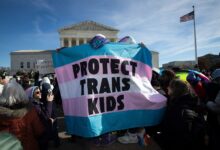Federal Judge Blocks Trump Passport Policy That Targeted Trans and Nonbinary Americans
Expanded injunction halts policy that erased accurate gender identity from passports.

In a major win for transgender and nonbinary Americans, a federal judge on Tuesday blocked the Trump administration’s restrictive passport policy that would have denied thousands of Americans the ability to accurately reflect their gender identity on official travel documents.
U.S. District Judge Julia Kobick ruled that the policy, introduced by President Donald Trump via executive order in January, likely violates the constitutional rights of trans and nonbinary individuals. Her ruling halts enforcement of the policy for a broader group of people than originally covered in an earlier injunction.
The Trump directive imposed a narrow, binary definition of sex—stating individuals are either male or female, and rejecting the legitimacy of gender transition or nonbinary identities. Under that policy, passport applicants would have been forced to use the gender marker assigned at birth, effectively erasing recognition of their actual identities.
Kobick, who was appointed by President Joe Biden, had previously blocked the policy for six plaintiffs in a lawsuit brought by the American Civil Liberties Union. Her expanded ruling now protects anyone who is transgender or nonbinary and lacks a valid passport, has a passport expiring within a year, or needs to apply due to loss, theft, or a name or gender marker change.
“The Executive Order and the Passport Policy on their face classify passport applicants on the basis of sex and thus must be reviewed under intermediate judicial scrutiny,” Kobick wrote in her initial injunction. “The government has failed to meet this standard.”
In Tuesday’s ruling, she rejected the administration’s argument that the policy was necessary or constitutionally justified, writing that any harm to the executive branch was the result of adopting a policy “that likely violates the constitutional rights of thousands of Americans.”
The lawsuit, filed by the ACLU, highlighted the harm inflicted by the policy. One woman had her passport returned marked as male. Others feared applying altogether, worried that the State Department might suspend their application or withhold their documents.
One plaintiff submitted their passport on Jan. 9, requesting a change from male to female along with a name update. At the time of the court filing, that person still had not received their passport and feared missing key personal and professional milestones, including a family wedding and a botany conference.
The Trump administration defended its stance by claiming broad presidential authority over passport rules and contending that the plaintiffs were not harmed, since they remained able to travel internationally. Kobick disagreed, finding that the administration failed to justify its policy under constitutional scrutiny or demonstrate any legitimate governmental interest.
Notably, the judge emphasized that the injuries faced by the plaintiffs were real and substantial—ranging from logistical barriers to international travel to the deep psychological harm caused by state-sanctioned misgendering.
The White House did not respond to a request for comment on the ruling.
The expanded injunction provides vital, if temporary, protection for many who feared losing access to accurate identification. For trans and nonbinary people, Kobick’s ruling affirms what they’ve long known to be true: their identities are valid, and their rights deserve protection under the Constitution.
As the case moves forward, the injunction will remain in place—marking an important, if incomplete, safeguard in the ongoing fight for full legal recognition and dignity for LGBTQ Americans.










